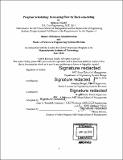| dc.contributor.advisor | Annalisa Weigel and Roy E. Welsch. | en_US |
| dc.contributor.author | Gould, Rebecca (Rebecca L.) | en_US |
| dc.contributor.other | Leaders for Global Operations Program. | en_US |
| dc.date.accessioned | 2016-09-27T15:15:03Z | |
| dc.date.available | 2016-09-27T15:15:03Z | |
| dc.date.copyright | 2016 | en_US |
| dc.date.issued | 2016 | en_US |
| dc.identifier.uri | http://hdl.handle.net/1721.1/104396 | |
| dc.description | Thesis: M.B.A., Massachusetts Institute of Technology, Sloan School of Management, 2016. In conjunction with the Leaders for Global Operations Program at MIT. | en_US |
| dc.description | Thesis: S.M. in Engineering Systems, Massachusetts Institute of Technology, School of Engineering, Institute for Data, Systems, and Society, 2016. In conjunction with the Leaders for Global Operations Program at MIT. | en_US |
| dc.description | Cataloged from PDF version of thesis. | en_US |
| dc.description | Includes bibliographical references (page 74). | en_US |
| dc.description.abstract | The Boeing 737 program has announced that they will continue to increase their production rate from 42 airplanes per month to eventually 52 airplanes per month. In order for the field to accommodate the increased production rates, opportunities are being considered for decreasing airplane production flow and the increasing capacity in the field. This thesis focuses on the opportunity for decreasing schedule flow through improvements in the scheduling process. Currently the field constraints do not heavily influence what order the planes roll out of the factory. This causes the field to deal with constraint variation by addressing the airplane schedule flow in order to make delivery. This thesis contributes to focusing on improving the scheduling process by driving more information being shared upstream in the decision making process and therefore decreasing the number of days needed to prepare the airplane for delivery. | en_US |
| dc.description.statementofresponsibility | by Rebecca Gould. | en_US |
| dc.format.extent | 74 pages | en_US |
| dc.language.iso | eng | en_US |
| dc.publisher | Massachusetts Institute of Technology | en_US |
| dc.rights | M.I.T. theses are protected by copyright. They may be viewed from this source for any purpose, but reproduction or distribution in any format is prohibited without written permission. See provided URL for inquiries about permission. | en_US |
| dc.rights.uri | http://dspace.mit.edu/handle/1721.1/7582 | en_US |
| dc.subject | Sloan School of Management. | en_US |
| dc.subject | Institute for Data, Systems, and Society. | en_US |
| dc.subject | Engineering Systems Division. | en_US |
| dc.subject | Leaders for Global Operations Program. | en_US |
| dc.title | Program scheduling : decreasing flow by back-scheduling | en_US |
| dc.title.alternative | Decreasing flow by back-scheduling | en_US |
| dc.type | Thesis | en_US |
| dc.description.degree | M.B.A. | en_US |
| dc.description.degree | S.M. in Engineering Systems | en_US |
| dc.contributor.department | Leaders for Global Operations Program at MIT | en_US |
| dc.contributor.department | Massachusetts Institute of Technology. Engineering Systems Division | |
| dc.contributor.department | Massachusetts Institute of Technology. Institute for Data, Systems, and Society | |
| dc.contributor.department | Sloan School of Management | |
| dc.identifier.oclc | 958269622 | en_US |
